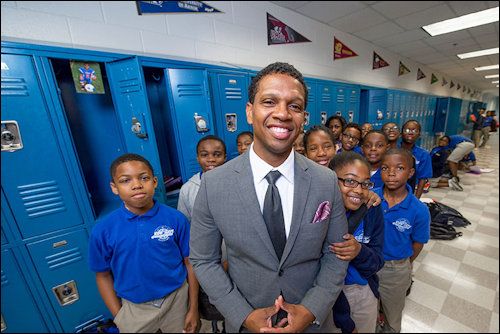
KIPP academy in Atlanta. Why not in Richmond or Petersburg? A proposed law could bring more charter schools to Virginia.
KIPP Academies teaches 80,000 students in 200 charter schools nationwide. Ninety-six percent of its students are minorities, 88% are on Free and Reduced Meals subsidies, and 17% are English language learners, according to Chris Braunlich, past president of the Virginia State board of Education and vice president of the Thomas Jefferson Institute, a fiscal conservative/free market think tank.
Despite their disadvantages, 94% of KIPP students graduate high school compared to 74% for low-income students nationally. Eighty-one percent start college compared to 45% nationally. And 44% complete college compared to nine percent nationally.
Here in Virginia, 94 schools have had their accreditation denied and more than half those schools came from just five school divisions. Yet KIPP Academies does not operate a single charter school in the state.
Virginia’s state constitution gives local school boards absolute authority to oversee their schools. As Braunluch pointed out in a recent Richmond Times-Dispatch op-ed, “Successful charter operators will not come to Virginia because the inability in this state for them to manage their own schools under the conditions set down by local school boards has made Virginia an inhospitable state for quality charter operators, and few strong applicants seek to open here.”
But there may be a way around the problem, short of revising the state constitution. Writes Braunlich:
Delegate Steve Landes, chairman of the House Education Committee, has now come forward with a proposal, sponsored in the Senate by Senator Mark Obenshain, offering a pathway towards providing alternatives for the children suffering in [failing] schools. The same state constitution granting absolute authority to local school divisions also grants the State Board of Education the right to create new school divisions “subject to the criteria and conditions set by the General Assembly.”
Landes’ legislation sets the criteria under which the State Board can exercise its right to create regional charter school divisions, offering independent quality public schools. These new regional charter school divisions would focus only in areas where schools have been denied accreditation for two out of the last three years; would overlay geographically upon existing traditional school divisions, but leave existing local schools under the control of existing school boards; could not access local dollars; and would be subject to the same civil rights, health and safety requirements applicable to other public schools.
Virginia’s applicants are frustrated Moms and Dads who really don’t know how to make it work but are desperate to help their children. As a result, they put together a poor application, and local school board properly rejects it … but then brags, “Well, we don’t get any good applications,” creating a self-fulfilling prophecy.
Under the Landes-Obenshain proposal, local school districts would continue to operate unimpeded, retaining local control and keeping local funds. Because they are no longer responsible for educating children who attend charter schools, local school districts actually would wind up with more money per student. At the same time, parents desperate to escape under-performing schools will have an option they didn’t have before. This is a win-win for everyone.
It eludes me how any well-meaning person could oppose this arrangement. The bill addresses all the usual objections — that charter schools will favor the affluent (as if it were a bad thing for middle-class kids to get a better education), that they will abet white flight, that they will drain other public schools of resources, that they will cherry pick the “best” of the low-income students (as if it were a bad thing to give them a shot at a decent education), or that they won’t be held accountable. What truly terrifies charter opponents, I suspect, is that they will be successful. And what would that say about the pieties and orthodoxies that prevail in public schools today?


